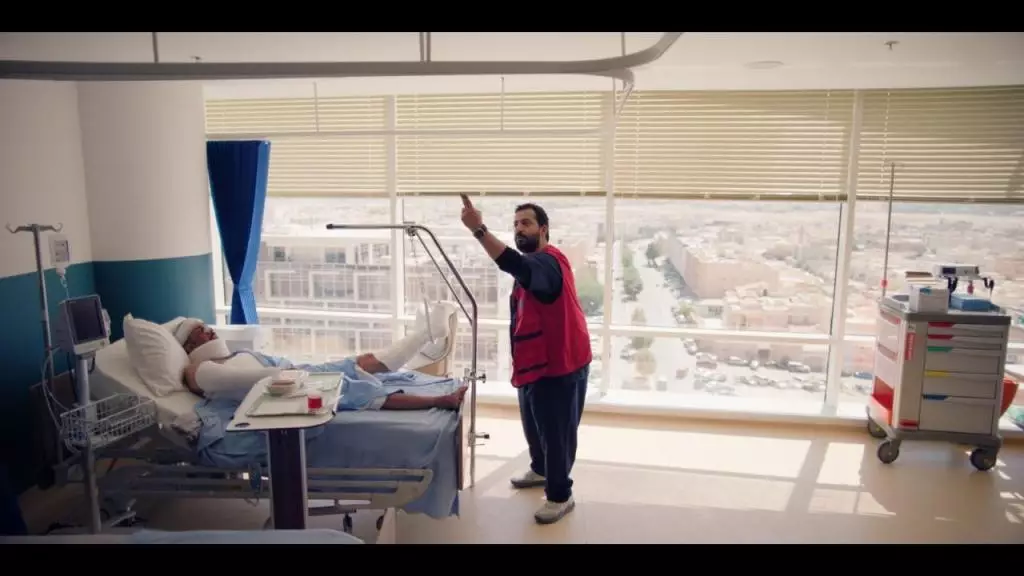The burgeoning film industry in Saudi Arabia takes a significant leap forward with the upcoming comedy feature “Esaaf” (working title), directed by the acclaimed Colin Teague. In a partnership that uniquely combines local talent and global expertise, this film represents the inaugural project from the House of Comedy, helmed by beloved Saudi actor Ibrahim Al Hajjaj, and the creative forces at Black Light, led by producer Peter Smith. Underlying their collaboration is a shared vision of amplifying the comedic narrative in a region eager for authentic cultural representation.
“Hence, ‘Esaaf’ is much more than just a film—it’s a declaration of intent,” asserts Al Hajjaj. The story revolves around two bumbling paramedics who inadvertently find themselves embroiled in a kidnapping incident, setting the stage for a delightful blend of humor and suspense. This narrative, while comedic at its core, reflects the more profound societal themes and challenges faced within the Kingdom, making it not just entertaining but also relevant.
The Innovative Minds Behind the Film
What makes “Esaaf” particularly intriguing is its creative arsenal. Colin Teague, a BAFTA nominee with an impressive slate of directorial credits including work on “Doctor Who” and “Being Human,” brings a wealth of experience in handling varied genres. His previous engagements in the Saudi film realm lend him an understanding of local nuances, crucial for a comedy intended to resonate with Saudi audiences.
Alberto Lopez, the British screenwriter behind the project, infuses a fresh sensibility into the narrative framework. Having previously worked on the Saudi-produced film “Rupture,” Lopez’s transition to writing “Esaaf” signals an increasing collaboration between Western and Saudi creative forces. Smith’s experience at MBC Studios, paired with his ambition to foster comedic storytelling, further solidifies the project’s promise—injecting a distinct flavor of humor while retaining cultural authenticity.
The film’s progress indicates a strategic initiative to cater specifically to the comedic appetite of regional viewers. Al Hajjaj highlighted the importance of “modern, authentic, and genuinely funny” content, making it clear that “Esaaf” aims to pave the way for future comedic storytelling within the Saudi film arena. Following the massive success of his previous film “Sattar,” which dominated the Saudi box office in 2023, Al Hajjaj’s confidence in the appeal of local comedy is evident.
Interestingly, Saudi Arabia has historically been lacking vocal comedic portrayals in cinema, often leaning towards international offerings. By producing content that resonates with the everyday experiences and struggles of Saudi nationals, the creative team behind “Esaaf” seeks to cultivate a newfound appreciation for local humor that can compete on an international stage.
Market Dynamics and Future Prospects
As the global film landscape evolves, so too does the demand for Arabic content. Peter Smith has articulated a vision of releasing one to two comedic films and series annually, emphasizing the necessity of growing the genre in Saudi Arabia. His remark that “the box office is still growing” is indicative of a market in flux, driven by a desire for narratives that reflect local identities while also engaging foreign audiences.
The filmmakers are targeting an April release for “Esaaf,” and their optimism is palpable, with aspirations of creating amusing films that can “go toe-to-toe with any other film in the market.” The call to shake up the cinematic landscape is clearly echoed in their ambitions, drawing a parallel with popular action-comedy franchises like “Bad Boys” and “Rush Hour,” but aiming to deliver it at a fraction of the cost—a tantalizing prospect for cinephiles in the region.
“Esaaf” embodies a cultural turning point for Saudi cinema. By prioritizing comedy—an often overlooked genre in the regional film industry—the film not only aspires to entertain but also to challenge existing norms and ignite a conversation about local storytelling. As these visionary creatives set out to redefine the cinematic landscape, the hopes surrounding “Esaaf” signal an exciting future for both Arabic cinema and the audiences eager for relatable, laughter-filled narratives.


Leave a Reply